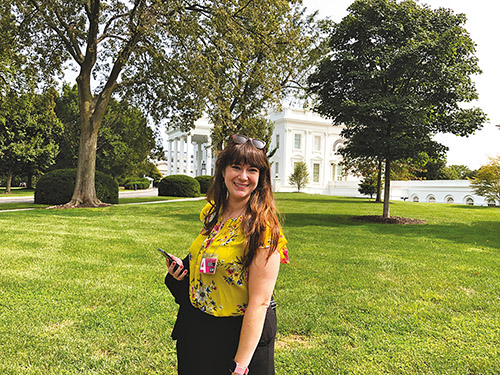
New Jersey native Lahav Harkov knows Israeli politics inside out. She spent eight years as the Jerusalem Post’s Knesset reporter and the last three as the news outlet’s senior contributing editor and diplomatic correspondent. She has interviewed dozens of senior Israeli leaders, including Prime Minister Benjamin Netanyahu as well as Yair Lapid and Naftali Bennett when they served at the helm of the country. Her impressive twitter presence of 112,000 followers is telling of the name she has built for herself as a prominent journalist for Israel’s English-speaking media.
Harkov is not the first in her family to embark on the path of journalism. Her grandmother Rivka used to write for women’s magazines in Israel and about the Jewish state in New York newspapers. Harkov describes her grandmother as “an amazing storyteller to this day.” The younger Harkov was drawn to this path of storytelling and writing from an early age, and it was her grandmother who encouraged her to follow her dreams. After making aliyah from Long Branch in 2005, she studied communications and political science at Bar Ilan University.
In her current role at The Jerusalem Post, Harkov covers Israel’s relations with other nations, the Foreign Ministry, the Prime Minister’s Office and the National Security Council. She also covers international relations issues and writes detailed analysis about major issues relating to Israeli politics, explaining the issues and introducing the variety of viewpoints to her readers.
According to Harkov, the most meaningful diplomatic event that she has covered is the Abraham Accords. In August of 2020, she was on the first direct commercial Israeli flight to the United Arab Emirates, along with senior Israeli and American officials. Two weeks later, she flew to Washington to cover the signing of the Abraham Accords. She shared that there was much excitement on the flight from Tel Aviv to Washington. “Some things, you are not entirely sure that people are going to learn in history books, not every little, tiny, minute detail. Whereas this is something that people are going to be talking about for a very long time. And it was very moving,” she said. “I felt really privileged to be a witness to history.”
Though the Prime Minister walked to the back of the plane to greet the members of the delegation, he did not engage in one-on-one conversations with them. “Netanyahu is not somebody who I think really lets people in. Certainly not journalists,” she shared. She had the opportunity to interview Prime Minister Netanyahu in March of 2021 for the Tel Aviv International Salon. During the thirty-minute interview that was conducted in English, the Prime Minister answered Harkov’s questions, addressing his Israeli-Anglo constituents ahead of elections. She was most looking forward to his answer to her question on his highly secretive November 2020 meeting with Crown Prince of Saudi Arabia Mohammed bin Salman Al Saud. Netanyahu responded to Harkov’s question with a smile, “What’s it like asking questions that you know you won’t get an answer to?”
Harkov’s working relationship with Bennett was quite different. She began covering the former prime minister the first day he entered politics, while she was still a Knesset reporter. “I felt like I knew him pretty well,” she said. “He’s not as guarded. He’s a lot more earnest. He wears his heart on his sleeve a lot more. I think it’s because they have had very different life experiences as politicians.”
In August of 2021 Harkov accompanied Bennett to Washington to meet with President Biden. Due to unforeseen schedule changes, their meeting was pushed off and Bennett, who is Shomer Shabbat, had to remain in Washington until Saturday night. Harkov wrote about this Shabbat experience in a Jerusalem Post article titled, “A Shabbat to remember with Prime Minister Bennett.”
“Bennett walked in with the energy of a Bnei Akiva counselor ready to start a Shabbaton. He stood at the buffet table and said a few words of Torah about leadership,” Harkov wrote. “During dinner, Bennett walked around and talked to the journalists, asking everyone how they were managing being stuck in Washington for an extra couple of days.”
Harkov would love the opportunity to interview Prime Minister Netanyahu a second time and ask him “what he really thinks” about Israel’s proposed judicial reforms, which he has been mostly silent on. She would also like to interview Mossad Director David Barnea, particularly about what Israel is doing to prevent Iran from obtaining nuclear weapons. Often stories on this subject are leaked by foreign media outlets, but this issue is highly confidential and kept top secret.
Harkov sees her role at The Jerusalem Post,which boasts 10-12 million unique monthly visitors online,as a significant one in telling the story about Israeli democracy. And the fact that she is an immigrant raising Israeli children is beneficial in her line of work. Many English-speaking correspondents covering Israeli news live in Israel for a few years but don’t fully integrate into the society or become a part of the culture. “People who have made their lives here in Israel have a broader perspective on what’s happening here,” she explained. “So I think that olim have a really important role in telling Israel’s story.”
Harkov hopes to write at least one book within the next decade, though she is keeping the details of the content to herself. And what does her grandmother say about her writing? Harkov says that she is very proud of her. The younger Harkov set up a bookmark on her grandmother’s phone so that she can easily access her latest articles.
“People say that journalism and newspapers are the first draft of history,” Harkov said. “I’m happy to open a window to Israel for the world.”
Follow Harkov on twitter at @LahavHarkov.
Alisa Bodner is a Fair Lawn native who immigrated to Israel a decade ago. She is a nonprofit management professional who enjoys writing in her free time.









